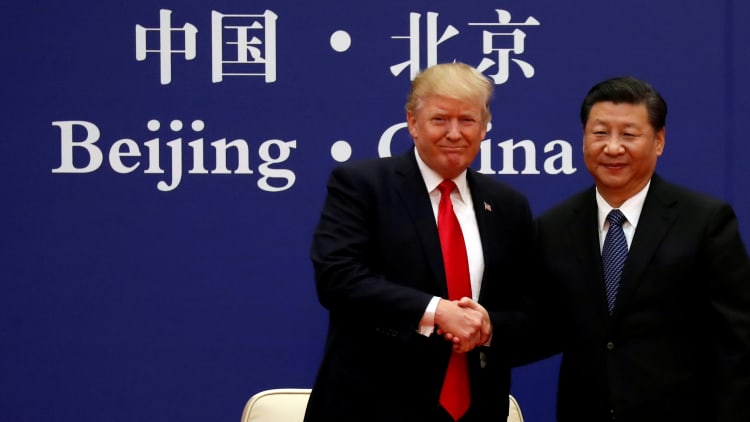
Stocks fell on Wednesday, with the major indexes posting their third consecutive decline, as investors took a breather following sharp gains this year. Wall Street also sought further indications that a trade deal between China and the U.S. could be reached in the near future.
The Dow Jones Industrial Average pulled back 133.17 points to 25,673.46 as Walgreens Boots Alliance lagged. The fell 0.65 percent to 2,771.45, led by declines in the energy and health care sectors. The Nasdaq Composite declined 0.9 percent to 7,505.92, notching its first three-day losing streak of the year.
Dow Transports, meanwhile, dropped half a percent to post its ninth straight decline, its longest slide since 2009. Small cap stocks also closed lower, with the Russell 2000 sliding 2 percent.
The S&P 500 energy sector fell more than 1 percent as U.S. crude prices were under pressure amid a surge in supply. The Energy Information Administration said crude inventories spiked by 7.1 million barrels last week, sending prices down 0.6 percent.
Health-care stocks in the S&P 500 pulled back more than 1 percent. Shares of Nektar Therapeutics and HCA Healthcare dragged down the sector, falling more than 4 percent each.
"Most of the big items that have driven the market over the past two months are done," said Tom Martin, senior portfolio manager at Globalt. "The market is guessing there will be some sort of trade deal that will end the larger hostilities."
"The news has people waiting; that's what you're seeing in the averages over the last several days," Martin said.
Three sources told CNBC that President Donald Trump wants the U.S. and China to strike a deal in hopes of boosting stock prices ahead of the 2020 election. The sources said Trump thinks getting a deal on trade would accomplish that.
Earlier this week, sources told CNBC the U.S. and China were in the "final stages" of trade talks, with the two sides planning a Mar-a-Lago summit for the end of the month. U.S. Secretary of State Mike Pompeo also said Monday he thought Washington and Beijing were "on the cusp" of reaching a deal.
Stocks are off to a hot start this year, with the S&P 500 rising more than 11 percent through Tuesday's close. Increasing expectations that a trade deal will get done have partly helped equities surge in 2019.
However, there is growing fear that an agreement may be fully priced in, possibly limiting any more gains from positive trade news.
"The concerns around trade have really held back the U.S," said Greg Luken, CEO of Luken Investment Analytics. "If you talk about the wall of worry right now, there's a level of anxiety, just from talking to clients, they have not had since 2013, when we had worries that the EU was going to melt down."
Recently, the S&P 500 has had trouble making a significant break above 2,800, a key level being watched by investors. The broad index closed above that level on Friday, but fell back below it this week.
Investors also digested key economic data on Wednesday. ADP and Moody's Analytics said private payrolls rose by 183,000 in February. Economists polled by Dow Jones had forecast a gain of 185,000. January payrolls were revised higher by 87,000 to 300,000.
Meanwhile, the U.S. trade deficit increased to a 10-year high of $59.8 billion despite the administration's efforts to reduce the number. Economists surveyed by Refinitiv expected the number to increase to $57.3 billion.
"There's just a lot of good news priced in. We've had more than a year's worth of gains already on the progress with China and the Fed [staying patient]," said Aaron Clark, portfolio manager at GW&K Investment Management. "It makes sense that we get a digestion period after such a strong rally. I think that's what we're seeing now."
General Electric shares fell more than 7.5 percent after J.P. Morgan analyst Stephen Tusa said in a note the company's stock is overvalued given the hurdles it faces over the next two years. Tusa kept his price target at $6 per share, noting that "looks generous" at this time.
—CNBC's Silvia Amaro contributed to this report.


